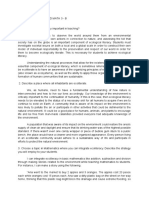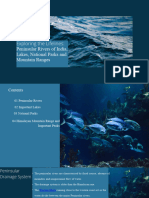CLASS :10 SUBJECT : ENGLISH REVISION ASSIGNMENT :1
1. Discursive Passage Questions
Read the passage given below:
1. Water is one of the most essential resources on Earth, yet it is often taken for granted. Despite its abundance, the reality is that
only a small fraction of the world's water is fresh and available for human use. With increasing populations, climate change, and
industrial demands, our water resources are growing. This makes water conservation not just a collective responsibility but a
crucial individual duty. Each person's effort towards conserving water can significantly impact the preservation of this vital
resource for future generations.
2. One of the key aspects of water conservation efforts is to think about the cumulative effect of small actions which may seem
trivial on their own. However, when multiplied by millions of people, these actions can lead to a substantial outcome. For
example, a single dripping tap can waste over 15 litres of water a day. Imagine the water saved if every household in a city
repaired just one leaky faucet. This highlights the power of collective individual actions in reducing water wastage.
3. Moreover, personal efforts towards water conservation often lead to greater awareness and education. When individuals take
steps to conserve water, they become more conscious of their water usage and the importance of this resource. This awareness can
then spread within communities, inspiring others to adopt similar practices. For instance, a family that installs water-saving
devices in their home may encourage their neighbors to do the same, creating a ripple effect. This grassroots approach to
conservation can be particularly effective in areas where large-scale initiatives may be slow to implement or gain support.
4. In addition to daily habits, individuals can also make a difference through more significant lifestyle choices. For instance,
opting for drought-resistant plants in gardens and supporting water-efficient agriculture can all contribute to water conservation.
Agriculture, especially livestock farming, is one of the largest consumers of water globally. By supporting sustainable farming
practices, individuals can indirectly reduce the water footprint of their food.
5. Critics might argue that individual efforts are negligible compared to the large-scale water consumption by industries and
agriculture. From this perspective, it overlooks the potential for individual actions to drive systemic change. When people
collectively make water-conscious choices, they send a powerful message to businesses and policymakers about the importance of
conservation.
6. Each person's commitment to saving water, no matter how small, contributes to a larger culture of sustainability. By making
conscious choices and spreading awareness, individuals can help ensure that future generations have access to the clean water they
need. Water conservation is not just the responsibility of governments and industries; it is a shared duty that begins with each of
us.
Answer the following questions, based on the passage above.
(A) In paragraph 1, what does the phrase ‘each person’s effort towards conserving water can significantly impact the preservation
of this vital resources’ emphasise?
(B) Completes the following with the correct option from the two given.
Water is often taken for granted, despite its essential nature because……………
(a) it is abundant and always easily accessible, making people less aware of its usage.
(b) its importance is not always recognised, leading people to overlook its value (paragraph 1)
(C) Support the writer's idea that small individual actions towards water conservation are not trivial. (paragraph 2)
(D) Select the option that best reflects the concept of a 'ripple effect' in the context of student life at school. (paragraph 3)
(a) A student's act of volunteering at a local charity leads to the school administration organising a large-scale fundraising event.
(b) A student who consistently follows good study practices inspires classmates to improve their own study routines,
creating a culture of academic excellence in the class.
(E) State whether the following statement is True or False.
The writer recommends grassroots efforts for large-scale initiatives. (paragraph 3)
(F) The writer mentions 'sustainable farming practices' in paragraph 4. Which of the following is a sustainable farming
practice?
(a) Using chemical fertilisers and pesticides extensively to increase crop yields.
(b) Clearing large areas of natural vegetation to expand farmland for organic farming.
(c) Implementing crop rotation and using organic compost to maintain soil health.
(d) Relying solely on monoculture farming to maximise production efficiency.
(G) List any two points that a powerful message sent to businesses and policy makers about the importance of
water conservation might include. (paragraph 5)
(H) Fill in the blank with the correct option from those given.
In the phrase 'culture of sustainability,' the word 'culture' refers to ................. . (paragraph 6)
(a) a set of beliefs and practices shared by a group
(b) the artistic and traditional practices specific to a community's heritage.
(c) the lifestyle habits and choices that are popular among the urban
(d) the techniques and methods used in development efforts
2. Highlight the importance of proper garbage disposal with an aim to create awareness among the city residents. Write a
letter regarding the same to the editor of a local daily Hindustan Times. You are Rubal of Shakti Nagar, Delhi.















































































